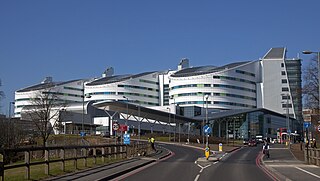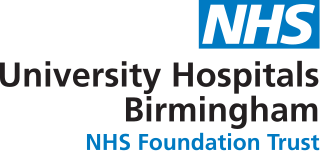
The Royal National Orthopaedic Hospital (RNOH) is a specialist orthopaedic hospital located in the London Borough of Harrow, United Kingdom, and a part of Royal National Orthopaedic Hospital NHS Trust. It provides the most comprehensive range of neuro-musculoskeletal health care in the UK, including acute spinal injury, complex bone tumour treatment, orthopaedic medicine and specialist rehabilitation for chronic back pain. The RNOH is a major teaching centre and around 20% of orthopaedic surgeons in the UK receive training there.

The Queen Elizabeth Hospital Birmingham is a major, 1,215 bed, tertiary NHS and military hospital in the Edgbaston area of Birmingham, situated very close to the University of Birmingham. The hospital, which cost £545 million to construct, opened on 16 June 2010, replacing the previous Queen Elizabeth Hospital and Selly Oak Hospital. It is one of the largest single-site hospitals in the United Kingdom and is part of one of the largest teaching trusts in England.

The University Hospitals Birmingham NHS Foundation Trust provides adult district general hospital services for Birmingham as well as specialist treatments for the West Midlands.

The Royal United Hospital (RUH) is a major acute-care hospital in the Weston suburb of Bath, England, which lies approximately 1.5 miles (2.4 km) west of the city centre. The hospital has 565 beds and occupies a 52 acres (21 ha) site. It is the area's major accident and emergency hospital, with a helicopter landing point on the adjacent Lansdown Cricket Club field. The hospital is operated by the Royal United Hospitals Bath NHS Foundation Trust.

The Radcliffe Infirmary was a hospital in central north Oxford, England, located at the southern end of Woodstock Road on the western side, backing onto Walton Street.

John Radcliffe Hospital is a large tertiary teaching hospital in Oxford, England. It forms part of Oxford University Hospitals NHS Foundation Trust and is named after John Radcliffe, an 18th-century physician and Oxford University graduate, who endowed the Radcliffe Infirmary, the main hospital for Oxford from 1770 until 2007.

Healthcare in the United Kingdom is a devolved matter, with England, Northern Ireland, Scotland and Wales each having their own systems of publicly funded healthcare, funded by and accountable to separate governments and parliaments, together with smaller private sector and voluntary provision. As a result of each country having different policies and priorities, a variety of differences have developed between these systems since devolution.

The National Health Service (NHS) is the conglomerate name for the publicly funded healthcare systems of the United Kingdom, comprising NHS England, NHS Scotland and NHS Wales. Health and Social Care in Northern Ireland was created separately and is often locally referred to as "the NHS". The original three systems were established in 1948 as part of major social reforms following the Second World War. The founding principles were that services should be comprehensive, universal and free at the point of delivery—a health service based on clinical need, not ability to pay. Each service provides a comprehensive range of health services, provided without charge for people ordinarily resident in the United Kingdom apart from dental treatment and optical care. In England, NHS patients have to pay prescription charges; some, such as those aged over 60, or those on certain state benefits, are exempt.

Guy's and St Thomas' NHS Foundation Trust is an NHS foundation trust of the English National Health Service, one of the prestigious Shelford Group. It runs Guy's Hospital in London Bridge, St Thomas' Hospital in Waterloo, Evelina London Children's Hospital, two specialist heart and lung hospitals, Royal Brompton and Harefield and community services in Lambeth, Southwark and Lewisham.

Wythenshawe Hospital is a large NHS teaching hospital in Wythenshawe, South Manchester, England. It provides general medical services to the local and regional area as well as being a national centre for respiratory medicine and cardiothoracic surgery. It is one of the larger hospitals within Manchester University NHS Foundation Trust.

Wexham Park Hospital is a large NHS hospital in Slough, Berkshire. It has been managed by Frimley Health NHS Foundation Trust since 2014. Sir Andrew Morris is the Trust's chief executive.

The Oxford Vaccine Group (OVG) is a vaccine research group within the Department of Paediatrics at the University of Oxford. It was founded in 1994 by Professor E. Richard Moxon, was initially based at the John Radcliffe Hospital, and moved in 2003 to its current location in the Centre for Clinical Vaccinology and Tropical Medicine (CCVTM) at the Churchill Hospital in Oxford, England. The group, led by Professor Andrew Pollard since 2001, comprises around 75 members across a number of disciplines, including consultants in paediatrics and vaccinology, clinical research fellows, research nurses, statisticians, post-doctoral laboratory scientists, research assistants and DPhil students.

Simon Laurence Stevens, Baron Stevens of Birmingham is a British public policy adviser, former CEO, and independent member of the UK House of Lords. He served as the eighth Chief Executive of the National Health Service in England from 2014 to 2021.
Oxford University Hospitals NHS Foundation Trust is an English teaching hospital and part of the Shelford Group. It is one of the UK's largest teaching hospitals and one of the largest hospitals in Europe. The trust is made up of four hospitals – the John Radcliffe Hospital, the Churchill Hospital and the Nuffield Orthopaedic Centre, all located in Oxford, and the Horton General Hospital in Banbury, north Oxfordshire.

The Robert Jones and Agnes Hunt Orthopaedic Hospital (RJAH) in Gobowen, near Oswestry, Shropshire, England is a specialist orthopaedic hospital which provides elective orthopaedic surgery. It is managed by the Robert Jones and Agnes Hunt Orthopaedic Hospital NHS Foundation Trust.

Hereford County Hospital is an acute general hospital on Stonebow Road in Hereford. It is managed by Wye Valley NHS Trust.

Operation Rescript was the code name for the British military operation to help tackle the COVID-19 pandemic in the United Kingdom and its Crown Dependencies between 2020 and 2022. It was described as the UK's "biggest ever homeland military operation in peacetime" by the Ministry of Defence (MOD), involving up to 23,000 personnel within a specialist task force, named the COVID Support Force (CSF). The support was given at the request of the UK government, its devolved administrations and civil authorities through the Military aid to the civil authorities (MACA) mechanism.

The MRC Weatherall Institute of Molecular Medicine at the University of Oxford is a research institute located at the John Radcliffe Hospital in Oxford. Founded in 1989 by Sir David Weatherall, the institute focuses on furthering our understanding of clinical medicine at a molecular level. It was one of the first institutes of its kind in the world to be dedicated to research in this area.

The COVID-19 vaccination programme in the United Kingdom is an ongoing mass immunisation campaign for coronavirus disease 2019 (COVID-19) during the COVID-19 pandemic in the United Kingdom.
The following is a timeline of the COVID-19 pandemic in England during 2022. There are significant differences in the legislation and the reporting between the countries of the UK: England, Scotland, Northern Ireland, and Wales.



















